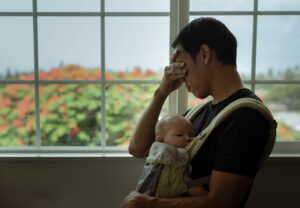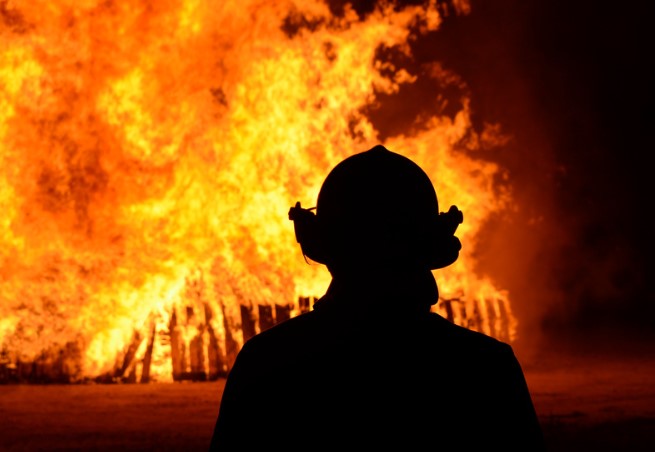Unpredictability: Sleep disruptions
Sleep can be disrupted for PSP families for a number of reasons. When PSP are at work, family members may have a hard time falling or staying asleep due to worry. The timing when PSP leave and return home can be out of sync with family members, interfering with their sleep and sleep routines. When PSP need to sleep in the day, family members change their activities to maintain quiet.
Both the shift work and the unpredictability of PSP work can interfere with sleep. In some PSP sectors, such as volunteer firefighting, there may be an expectation for a PSP to be on call often, leading to the possibility of call-ins at any time. This disrupts both their sleep and the sleep of their spouse/significant other (SSOs) and family members.
Unexpected call-ins and overtime can also lead to inconsistent schedules for children. Wake up, bedtimes, and nap times might get rearranged due to the unpredictability of PSP work.
Why is it so hard to sleep when the PSP is at work?
PSP’s daytime sleep is out of sync with family life

- Family members feel like they have to be especially quiet.
- Routines and extracurriculars for family members can be disrupted.
- Weekends and holidays when the whole family tends to be home are particularly challenging.
- Babies and young children who may cry create noise that interferes with the PSP’s sleep.
- Pets who play and need to go outside may also be at odds with the need for daytime sleep.
- All these issues were magnified during COVID-19 when family members stayed home to work or attend virtual school.
- PSP sleeping in the day throws off everyday family routines such as mealtimes.
- When PSP sleep during the day, their bedtime is often out of sync with the family that night.
Try: Skill-building Exercises
Need Something More?
Check out our self-directed Spouse or Significant Other Wellbeing Course.
References for this page (click to expand)
Ananat, E. O. & Gassman-Pines, A. (2021). Work schedule unpredictability: daily occurrence and effect on working parents’ well-being. Journal of Marriage and Family, 83(1):10-26. https://doi.org/10.1111/jomf.12696
Bochantin, J. E. (2010). Sensemaking in a high-risk lifestyle: The relationship between work and family for public safety families. PhD Thesis. ProQuest Dissertations Publishing.
Cowlishaw, S., Evans, L., & McLennan, J. (2010). Work-family conflict and crossover in volunteer emergency service workers. Work & Stress, 24(4), 342–358. https://doi.org/10.1080/02678373.2010.532947
Cox, M., Norris, D., Cramm, H., Richmond, R., & Anderson, G. S. (2022). Public safety personnel family resilience: A narrative review. International Journal of Environmental Research and Public Health, 19(9), 5224. https://doi.org/10.3390/ijerph19095224
Friese, K. M. (2020). Cuffed together: A study on how law enforcement work impacts the officer’s spouse. International Journal of Police Science & Management, 22(4), 407-418. https://doi.org/10.1177/1461355720962527
Hill, R., Sundin, E., & Winder, B. (2020). Work–family enrichment of firefighters: “satellite family members”, risk, trauma and family functioning. International Journal of Emergency Services, 9(3), 395-407. https://doi.org/10.1108/IJES-08-2019-0046
Landers, A. L., Dimitropoulos, G., Mendenhall, T. J., Kennedy, A., & Zemanek, L. (2020). Backing the blue: Trauma in law enforcement spouses and couples. Family Relations, 69(2), 308-319. https://doi.org/10.1111/fare.12393
Regehr, C., Dimitropoulos, G., Bright, E., George, S., & Henderson, J. (2005). Behind the brotherhood: Rewards and challenges for wives of firefighters. Family Relations, 54(3), 423-435. https://doi.org/10.1111/j.1741-3729.2005.00328.x
Tuttle, B. M., Giano, Z., & Merten, M. J. (2018). Stress spillover in policing and negative relationship functioning for law enforcement marriages. The Family Journal (Alexandria, Va.), 26(2), 246-252. https://doi.org/10.1177/1066480718775739
Watkins, S. L., Shannon, M. A., Hurtado, D. A., Shea, S. A., & Bowles, N. P. (2021). Interactions between home, work, and sleep among firefighters. American Journal of Industrial Medicine, 64(2), 137-148. https://doi.org/10.1002/ajim.23194
How might physical injury affect PSP families?
Some PSP family members have identified the risk of physical and mental injury as their greatest worry.
Spillover

The risk of injury or illness can create stress for the PSP. This stress can spill over into family life causing tension. At the same time, family members may also be fearful and worry about the dangers of the job. The wellbeing of the PSP family member, loss of income, and disruptions to family life are primary concerns. Open communication about the real risks and contingency plans can prevent worry from getting out of control.
Physical stress

Family members often become caregivers when a PSP is injured or ill. There may be physical demands associated with this care. Family caregivers may experience physical fatigue due to increased responsibilities. This can put their own health at risk and lead to role overload. The expectation that spouses or significant others (SSOs) or other family members will provide care is not always realistic. It is important for PSP couples and families to have conversations about caregiving.
Emotional distress

When a family member is injured or ill, family life changes. There are worries along with added responsibilities for SSOs and other family caregivers. They may experience the emotional distress of ‘not being able to do it all’ and concerns about the future. Having a network of support during these times can be invaluable. It can be useful to think in advance about who can be relied on for support. It is important to consider those who can offer both practical help and emotional support.
Social isolation

Routines and social activities can also be disrupted by an illness or injury. There may be less time and fewer opportunities to engage in activities outside of the home. Attention to caregiving may result in an SSO taking time off work. Added responsibilities may also limit contact with friends and family. Altogether, access to much needed social support is lessened. Having realistic expectations about how care might be managed ahead of time can help prevent such outcomes.
Shifting relationships

When PSP have a brain injury or a posttraumatic stress injury (PTSI), they may experience behavioural changes. This can impact intimacy in couple relationships and shift additional responsibilities to SSOs. These types of injuries can also affect parent-child relationships. There may be heightened expectations for children to regulate their behaviours. It is important for families to support both the wellbeing of the PSP and individual family members.
Financial strain

Both short and long term injuries or illnesses can put financial strain on PSP couples or families. There may be temporary or permanent loss of income for the PSP. SSOs may cut back hours of paid work to provide care which further reduces household income. Reduced earning potential and expenses associated with care can cause financial strain. It is important for families to develop a financial plan to manage these risks.
Try: Skill-building Exercises
Need Something More?
Check out our self-directed Spouse or Significant Other Wellbeing Course.
References for this page (click to expand)
American Psychological Association. (2022). APA Dictionary of Psychology. American Psychological Association. Retrieved July 18, 2022, from https://dictionary.apa.org/
Bochantin, J. E. (2010). Sensemaking in a high-risk lifestyle: The relationship between work and family for public safety families. PhD Thesis. ProQuest Dissertations Publishing.
Cox, M., Norris, D., Cramm, H., Richmond, R., & Anderson, G. S. (2022). Public safety personnel family resilience: a narrative review. International Journal of Environmental Research and Public Health, 19(9), 5224. https://doi.org/10.3390/ijerph19095224
Friese, K. M. (2020). Cuffed together: A study on how law enforcement work impacts the officer’s spouse. International Journal of Police Science & Management, 22(4), 407-418. https://doi.org/10.1177/1461355720962527
Helfers, R. C., Reynolds, P. D., & Scott, D. M. (2021). Being a blue blood: A phenomenological study on the lived experiences of police officers’ children. Police Quarterly, 24(2), 233-261. https://doi.org/10.1177/1098611120964954
Karaffa, K., Openshaw, L., Koch, J., Clark, H., Harr, C., & Stewart, C. (2015). Perceived impact of police work on marital relationships. The Family Journal (Alexandria, Va.), 23(2), 120-131. https://doi.org/10.1177/1066480714564381
Landers, A. L., Dimitropoulos, G., Mendenhall, T. J., Kennedy, A., & Zemanek, L. (2020). Backing the blue: Trauma in law enforcement spouses and couples. Family Relations, 69(2), 308-319. https://doi.org/10.1111/fare.12393
Miller, L. (2007). Police Families: Stresses, Syndromes, and Solutions. The American Journal of Family Therapy, 35(1), 21-40. https://doi.org/10.1080/01926180600698541
Watkins, S. L., Shannon, M. A., Hurtado, D. A., Shea, S. A., & Bowles, N. P. (2021). Interactions between home, work, and sleep among firefighters. American Journal of Industrial Medicine, 64(2), 137-148. https://doi.org/10.1002/ajim.23194
Anxiety
When a person experiences anxiety, it can feel like nervousness or fear. Anxiety involves anticipating some kind of danger or negative event, either real or imagined. Anxiety can lead to physical reactions like an increased heart rate, shallow breathing, and/or muscle tension. It is an emotion that can be experienced both in the moment and over longer periods of time. When anxiety endures, it may indicate a more serious health concern that you may not be able to resolve or overcome on your own.
If you are experiencing significant worry or anxiety that interferes with your day-to-day life (e.g., work, relationships, sleep, or other important parts of your life), it is recommended that you consult your health care provider.
The unpredictability of PSP work
PSP families learn to expect the unexpected, but it is not easy to do. Anxiety is a response to something that is on our mind but has not happened. There are many factors associated with PSP work that can heighten worry, tension, and fear. We must understand the sources of our anxiety before we can think about strategies to manage these emotions. Below are a few of the factors that can cause anxiety in PSP families.
Silence

PSP family members may learn about an incident in real time. When they cannot get updates or reach the PSP family member, worry and anxiety can surge.
Injury

PSP work can be high-risk. Family members can worry that physical or mental injury could happen at any moment.
Media and public perception

Families can be worried and stressed by reports from media and social media. The public can react to particular events or sectors in ways that can create anxiety for PSP and their family members.
Situation

PSP work is unpredictable and there is always a possibility of danger. An individual PSP can react in a variety of ways to different incidents. There is always uncertainty about how someone will react to trauma or trauma exposure.
Unexpected absence

PSP can get unexpectedly called into work or be required to work overtime. At other times, they are unable to leave their shift as planned because of shift overruns or personal debriefings. SSOs may have to explain why PSP family members aren’t at family events and celebrations.
Return home

After an incident at work, PSP can feel a range of emotions. They may not be able to be emotionally present when they return home. It is difficult to predict whether they will want to talk, or need some quiet time. Families can experience anticipatory vigilance and feel like they need to ‘walk on eggshells’.
What is catastrophic thinking?
- When we don’t have all the information about something, we can fill in the blanks. When we fill in the blanks with worst-case-scenario possibilities, we experience catastrophic thinking.
- The unpredictability of PSP life can lead to anxiety and anxiety can easily lead to catastrophic thinking. For example, if a PSP is late coming home because they are filling in paperwork, anxiety could lead a family member to think that their PSP is hurt or dead.
- While it is completely normal for PSP family members to have these fleeting thoughts, what is important is that they have ways to work through them. For practical suggestions on how to reframe catastrophic thoughts, please visit PSPNET Families Wellbeing Hub.

Try: Skill-building Exercises
Need Something More?
Check out our self-directed Spouse or Significant Other Wellbeing Course.
References for this page (click to expand)
American Psychological Association. (2022). APA Dictionary of Psychology. American Psychological Association. Retrieved July 18, 2022, from https://dictionary.apa.org/
Bochantin, J. E. (2010). Sensemaking in a high-risk lifestyle: The relationship between work and family for public safety families. PhD Thesis. ProQuest Dissertations Publishing.
Cox, M., Norris, D., Cramm, H., Richmond, R., & Anderson, G. S. (2022). Public safety personnel family resilience: a narrative review. International Journal of Environmental Research and Public Health, 19(9), 5224. https://doi.org/10.3390/ijerph19095224
Friese, K. M. (2020). Cuffed together: A study on how law enforcement work impacts the officer’s spouse. International Journal of Police Science & Management, 22(4), 407-418. https://doi.org/10.1177/1461355720962527
Helfers, R. C., Reynolds, P. D., & Scott, D. M. (2021). Being a blue blood: A phenomenological study on the lived experiences of police officers’ children. Police Quarterly, 24(2), 233-261. https://doi.org/10.1177/1098611120964954
Karaffa, K., Openshaw, L., Koch, J., Clark, H., Harr, C., & Stewart, C. (2015). Perceived impact of police work on marital relationships. The Family Journal (Alexandria, Va.), 23(2), 120-131. https://doi.org/10.1177/1066480714564381
Landers, A. L., Dimitropoulos, G., Mendenhall, T. J., Kennedy, A., & Zemanek, L. (2020). Backing the blue: Trauma in law enforcement spouses and couples. Family Relations, 69(2), 308-319. https://doi.org/10.1111/fare.12393
Miller, L. (2007). Police Families: Stresses, Syndromes, and Solutions. The American Journal of Family Therapy, 35(1), 21-40. https://doi.org/10.1080/01926180600698541
Watkins, S. L., Shannon, M. A., Hurtado, D. A., Shea, S. A., & Bowles, N. P. (2021). Interactions between home, work, and sleep among firefighters. American Journal of Industrial Medicine, 64(2), 137-148. https://doi.org/10.1002/ajim.23194
Anxiety
Anxiety can be experienced by PSP families for many reasons due to dangers which are part of the job. There is often the fear of injury or death associated with these dangers. Media reports of serious incidents and fatalities can increase feelings of anxiety for both adults and children. PSP are at higher risk of both psychological and physical injuries than the general public. This increased risk of injury and the harmful effects of events and situations create stress for both PSP and their families. This anxiety, stress, and tension can spill over into family life due to uncertainty about the PSP’s safety on the job. Physical injuries can have short- and long-term impacts on families. Families also worry about exposure to trauma which can affect mental health and family relationships. Worry is natural and unavoidable for most families. Families can support the wellbeing of family members by being aware of the effects and managing them in healthy ways.
What “fuels” worry and fear?
Please attempt this activity first, then read about the topic.
While many situations can “fuel” worry, everyone is unique. We all experience worry differently. PSP families have identified key factors that can shape anxiety.
Try: Skill-building Exercises
Need Something More?
Check out our self-directed Spouse or Significant Other Wellbeing Course.
References for this page (click to expand)
Alrutz, A. S., Buetow, S., Cameron, L. D., & Huggard, P. K. (2020). What happens at work comes home. Healthcare (Basel), 8(3), 350. https://doi.org/10.3390/healthcare8030350
Bochantin, J. E. (2017). Ambulance thieves, clowns, and naked grandfathers: How pses and their families use humorous communication as a sensemaking device. Management Communication Quarterly, 31(2), 278-296. https://doi.org/10.1177/0893318916687650
Cox, M., Norris, D., Cramm, H., Richmond, R., & Anderson, G. S. (2022). Public safety personnel family resilience: A narrative review. International Journal of Environmental Research and Public Health, 19(9), 5224. https://doi.org/10.3390/ijerph19095224
Helfers, R. C., Reynolds, P. D., & Scott, D. M. (2021). Being a blue blood: A phenomenological study on the lived experiences of police officers’ children. Police Quarterly, 24(2), 233-261. https://doi.org/10.1177/1098611120964954
Hoven, C. W., Duarte, C. S., Wu, P., Doan, T., Singh, N., Mandell, D. J., Bin, F., Teichman, Y., Teichman, M., Wicks, J., Musa, G., & Cohen, P. (2009). Parental exposure to mass violence and child mental health: The first responder and WTC evacuee study. Clinical Child and Family Psychology Review, 12(2), 95-112. https://doi.org/10.1007/s10567-009-0047-2
Landers, A. L., Dimitropoulos, G., Mendenhall, T. J., Kennedy, A., & Zemanek, L. (2020). Backing the blue: Trauma in law enforcement spouses and couples. Family Relations, 69(2), 308-319. https://doi.org/10.1111/fare.12393
Ricciardelli, R., Carleton, R. N., Groll, D., & Cramm, H. (2018). Qualitatively unpacking canadian public safety personnel experiences of trauma and their well-being. Canadian Journal of Criminology and Criminal Justice, 60(4), 566-577. https://doi.org/10.3138/cjccj.2017-0053.r2
Roth, S. G., & Moore, C. D. (2009). Work-family fit: The impact of emergency medical services work on the family system. Prehospital Emergency Care, 13(4), 462-468. https://doi.org/10.1080/10903120903144791
Sommerfeld, A., Wagner, S. L., Harder, H. G., & Schmidt, G. (2017). Behavioral health and firefighters: An intervention and interviews with Canadian firefighters. Journal of Loss & Trauma, 22(4), 307-324. https://doi.org/10.1080/15325024.2017.1284515
Controlling behaviours at home
Public safety organizations are ‘military-like’ because they have ranks and a chain of command. They require PSP to obey orders and rely on teamwork and rigorous training. Behaviours and traits that allow PSP to do their jobs well are respected and valued by organizations. However, these behaviours can affect couple and family relationships when they spill over into home life. If a PSP is having a hard time detaching from the job, it might lead to more controlling behaviours at home. What PSP witness on the job can also affect their behaviours at home and cause them to be overprotective of their families. Authoritarian spillover is a term used to describe the carry-over of these controlling behaviours into the home.
Authoritarian spillover: How it happens
The effects of controlling behaviours on families
Try: Skill-building Exercises
Need Something More?
Check out our self-directed Spouse or Significant Other Wellbeing Course.
References for this page (click to expand)
Agocs, T., Langan, D., & Sanders, C. B. (2015). Police mothers at home: Police work and danger-protection parenting practices. Gender & Society, 29(2), 265-289. https://doi.org/10.1177/0891243214551157
Badawy, P. J. & Schieman, S. (2021). With greater power comes greater stress? Authority, supervisor support, and work-family strains. Journal of Marriage and Family 83(1):40-56. https://doi.org/10.1111/jomf.12714
Cheema, R. (2016). Black and blue bloods: protecting police officer families from domestic violence. Family Court Review, 54(3), 487-500. https://doi.org/10.1111/fcre.12226
Greenhaus, J. H., & Beutell, N. J. (1985). Sources of conflict between work and family roles. The Academy of Management Review, 10(1), 76-88. https://doi.org/10.2307/258214
Miller, L. (2007). Police families: stresses, syndromes, and solutions. The American Journal of Family Therapy, 35(1), 21-40. https://doi.org/10.1080/01926180600698541
Ricciardelli, R., Carleton, R. N., Groll, D., & Cramm, H. (2018). Qualitatively unpacking Canadian public safety personnel experiences of trauma and their well-being. Canadian Journal of Criminology and Criminal Justice, 60(4), 566-577. https://doi.org/10.3138/cjccj.2017-0053.r2
Sommerfeld, A., Wagner, S. L., Harder, H. G., & Schmidt, G. (2017). Behavioral health and firefighters: an intervention and interviews with Canadian firefighters. Journal of Loss & Trauma, 22(4), 307-324. https://doi.org/10.1080/15325024.2017.1284515
Tuttle, B. M., Giano, Z., & Merten, M. J. (2018). Stress spillover in policing and negative relationship functioning for law enforcement marriages. The Family Journal (Alexandria, Va.), 26(2), 246-252. https://doi.org/10.1177/1066480718775739






